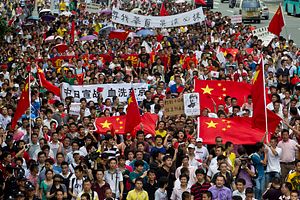A majority of Chinese believe their country will go to war with Japan according to a new survey.
On Tuesday the 10th Japan-China Public Opinion Poll was released. The annual survey of public opinion in both countries is jointly conducted by the Japanese non-governmental organization, the Genron NPO, and the Chinese state-run media outlet, China Daily.
The survey found a slight majority of Chinese (53.4 percent) believe that there will be a military conflict with Japan in the future, including 11.2 percent who say that the conflict will be sometime in the next few years. This figure is up slightly from last year, when 52.6 percent of Chinese said there would be a military conflict with Japan in the future, including over 17 percent who said it would happen in the next few years. At the same time, 27.4 percent of Chinese respondents believe there will not be a war with Japan in the future, which is down 5 percent from last year.
Japanese citizens are a lot more optimistic however, with only 29 percent of respondents saying there will be a military conflict with China in the future. This is up however from 23.7 percent who said the same thing last year. Similarly, while 38 percent of Japanese say there will not be a war with China in the future, this is down from the nearly 47 percent of Japanese who said the same thing last year.
The rising belief of an eventual war seems to be driven by a growing perception on both sides that the other country poses a security threat. For example, in past surveys the number of Japanese respondents who identified North Korea as a security threat have greatly outnumbered those who considered China a security threat. This is still true, but the gap is rapidly narrowing. Last year 73.4 percent of Japanese respondents identified North Korea as a security threat, compared with 61.8 percent who identified China as a security threat to Japan. This year, only 68.6 percent of Japanese respondents believe North Korea is a security threat, while 64.3 percent say the same thing about China. Not surprisingly, the dispute over the Senkaku Islands and Chinese patrols around them are the primary reason Japanese say China is a security threat. A slight majority also cite China’s military buildup.
Chinese respondents have traditionally identified the United States as the primary security threat to their country. However, the gap between the U.S. and Japan has narrowed considerably over the past year. This is largely because of a significant drop in the number of Chinese respondents who believe the U.S. is a military threat. However, those identifying Japan as a security threat has rose slightly. As a result, 57.8 percent of Chinese say that the U.S. is a security threat while 55.2 percent say the same about Japan. This is slightly misleading, however, as the primary reason Chinese respondents feel Japan is a security threat is because of its “attempt to besiege China on a military front in cooperation with the United States.”
It’s important to note that, although a growing number of Chinese and Japanese that believe their countries will go to war, this doesn’t appear to be the outcome they are in favor of. Indeed, 66.1 percent of Japanese and 52.2 percent of Chinese are in favor of China and Japan cooperating on important issues in Asia (on the other hand, over a third of Chinese are oppose cooperating with Japan, compared with just 7.7 percent of Japanese who oppose cooperating with China). Majorities in both countries also favor a China-Japan leadership summit.
Similarly, wide majorities in both countries (70 percent of Japanese and 65 percent of Chinese) believe that their bilateral relationship is important. Still, these numbers were the lowest recorded for both countries in the 10 years the survey has been conducted, and the decline has been swift. For example, the percentage of Chinese who believe the bilateral relationship with Japan is important has declined around 25 percent since 2010, when almost 93 percent of Chinese said it was important. Notably, both sides also feel significantly more affinity toward the United States and South Korea than they do to each other.
One of the areas where Japanese and Chinese views differ most significantly is on how to solve the Diaoyu/Senkaku dispute. Just under half of Japanese respondents say “the two countries should promptly proceed toward negotiations with a view to resolve their issues by peaceful means.” Only 22 percent of Japanese believe their country should strengthen its control over the islands in order to protect them. Nearly twice as many Japanese support bringing the case to the International Court of Justice. By contrast, 63.7 percent of Chinese respondents say their country should strengthen its control over the disputed territory. This is roughly twice the number of Chinese who support promptly proceeding with negotiations in order to find a peaceful solution.

































